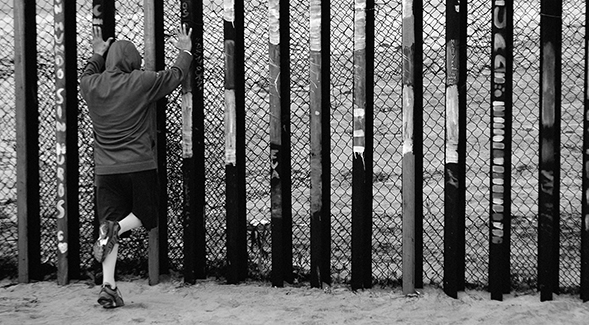Center for Human Rights Established
The center takes an interdisciplinary approach to engaging students in the comprehensive study of human rights.

“There is a vibrant global community here in San Diego that brings attention to a range of human rights topics.”
Interdisciplinary research, education and engagement on global issues of human rights are the focus of a new center in the College of Arts and Letters (CAL) at San Diego State University.
For the past three years, Grace Cheng, center director and professor of political science, led the Interdisciplinary Human Rights Initiative to engage students in the comprehensive study of human rights. With the establishment of the Center for Human Rights, the capacity for growth and expansion will benefit future students and promote collaborative projects on critical human rights issues.
“The center has great potential to expand offerings in critically needed human rights research and education,” Cheng said. “The curriculum allows students to think about and understand pressing local, national, and global human rights issues and topics.”
“The new Center for Human Rights will foster the study and amelioration of human rights abuses, melding hands-on learning with cutting-edge research,” said College of Arts and Letters Dean Monica J. Casper. “Given our location on Kumeyaay land and in proximity to the U.S.-Mexico border – where human rights abuses proliferate – SDSU is an ideal setting for expanding ongoing human rights work through establishment of this new center. Under Dr. Grace Cheng's leadership, I am confident the Center for Human Rights will flourish."
Cheng assembled a team of SDSU faculty with expertise in human rights issues to form the center’s steering committee. Professors of communication, anthropology, geography, women’s studies, Latin American studies, Chicana and Chicano studies, European studies, international security and conflict resolution, and film offer critical and relevant coursework.
“Collaborations with academic departments, local and global NGOs, student organizations, and partner institutions help provide synergy,” Cheng said. “There is a vibrant global community here in San Diego that brings attention to a range of human rights topics.”
“It is important to create awareness of human rights among our students in order to bring up a new generation that is aware and active in matters related to human rights in order to make our society fairer, tolerant, equitable, and more equal,” said William Twayigize, a professor at the Institute for International Security and Conflict Resolution.
“The topic of human rights can feel abstract or remote, but it is actually one that many people confront every day,” said Victoria González-Rivera, associate professor of Chicana/o studies and member of the Center for Human Rights steering committee. “I grew up in a right-wing dictatorship in Nicaragua during the 1970s, so I know first-hand what human rights abuses look like. Defending human rights is crucial to our survival as a planet.”
Impactful Curriculum
The academic study of human rights spans a range of subjects, including politics, law, business, economics, public health, and the environment, to offer unique insights into past and present human rights issues.
Twayigize teaches Our Global Future (ISCOR 310), an overview of the major resource and social crises facing the world today and how these issues affect us now and in the future. The course discusses possible sustainable solutions to these problems from a variety of perspectives including historical, environmental, and urban contexts.
The center offers a Certificate in Human Rights open to all majors, where students learn how to think critically about contemporary social and economic problems and how to develop solutions.
The center equips students for meaningful careers and connects them to experiential opportunities, such as research and other internships at NGOs and other human rights organizations locally and around the world.
“Providing students with important curricula on key human rights issues and approaches prepares them to be change-makers in our local community and globally,” said Erika Robb Larkins, director of the Behner Stiefel Center for Brazilian Studies, and member of the Center for Human Rights steering committee.
Future plans for the center include special research on human rights in the Americas and the human rights impact of climate change, a film and lecture series, expanded study abroad and internship opportunities, and additional courses covering relevant and timely topics.
“This new center comes at an excellent time, as so many of our most pressing societal challenges can be understood through a human rights lens,” Robb Larkins said.



